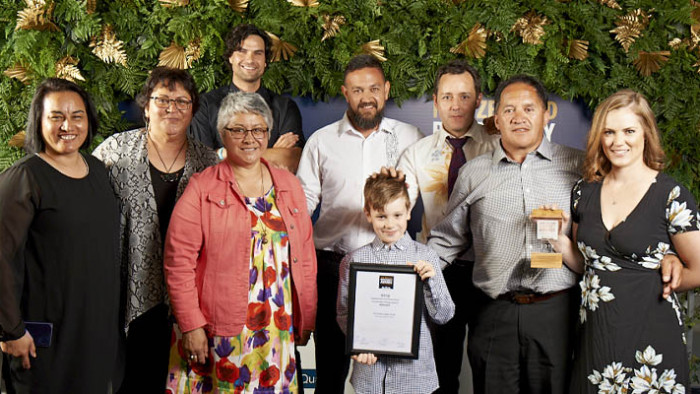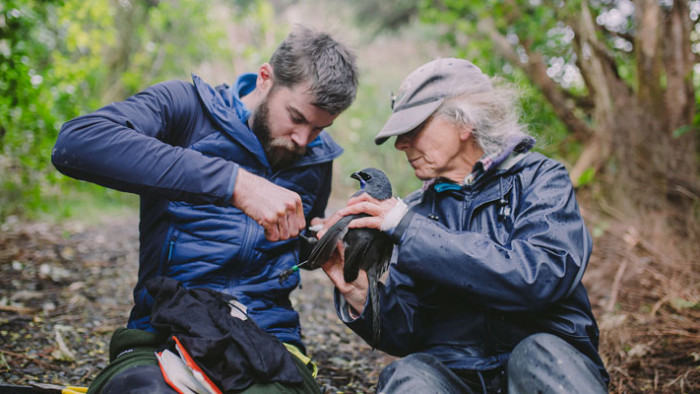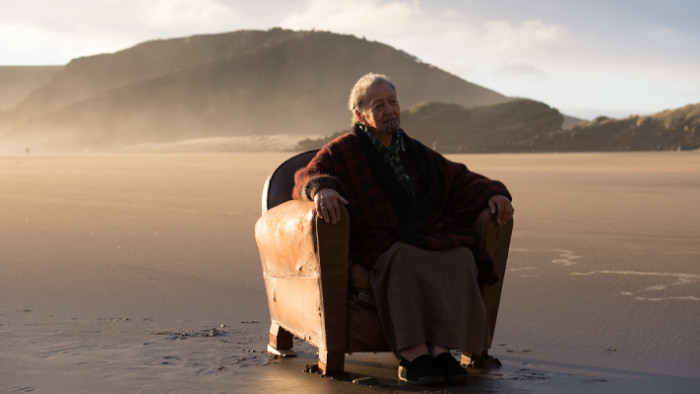2020 Biosecurity Award finalists and winners
New Zealand Biosecurity Supreme Award and GIA Industry Award
Winner: Miraka - New Zealand Biosecurity Supreme Award and GIA Industry Award
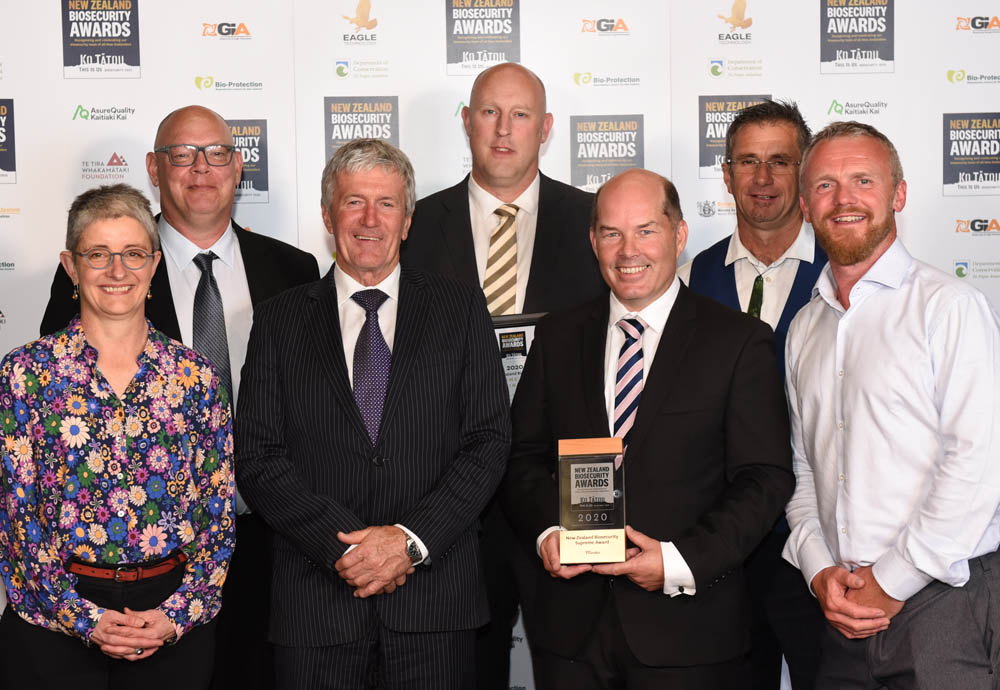
Programme: Te Ara Miraka - achieving enhanced biosecurity awareness and culture change on-farm
Miraka established its farming excellence programme – Te Ara Miraka – to build farmer resilience, future-proof farmer regulatory compliance, extend the organisational values across their value chain, and lastly to start a traceable brand story.
The programme has a robust foundation focusing on employment relations, health and safety, environmental stewardship, prosperity and food safety standards, and Miraka has been able to demonstrate compelling and tangible behaviour change to farming operations and farmer mindsets through education, resourcing and financial incentives.
After involvement with a sector foot and mouth disease exercise scenario example in 2017, Miraka identified that biosecurity was missing from the programme and set about working with external parties, Primary ITO and QCONZ to establish an industry-available and NZQA-funded farm owner/management training short course.
Each participant was trained in biosecurity risk assessment, risk mitigations and how to create and implement a biosecurity plan within their business.
Through educational initiatives and a 1c/kgms incentive, in just 12 months, 72 out of 104 Miraka farmers fulfilled the criteria and executed a biosecurity plan. The course is now available to all.
Hear from our award winner:
Finalist: Fruit Fly Council - GIA Industry Award
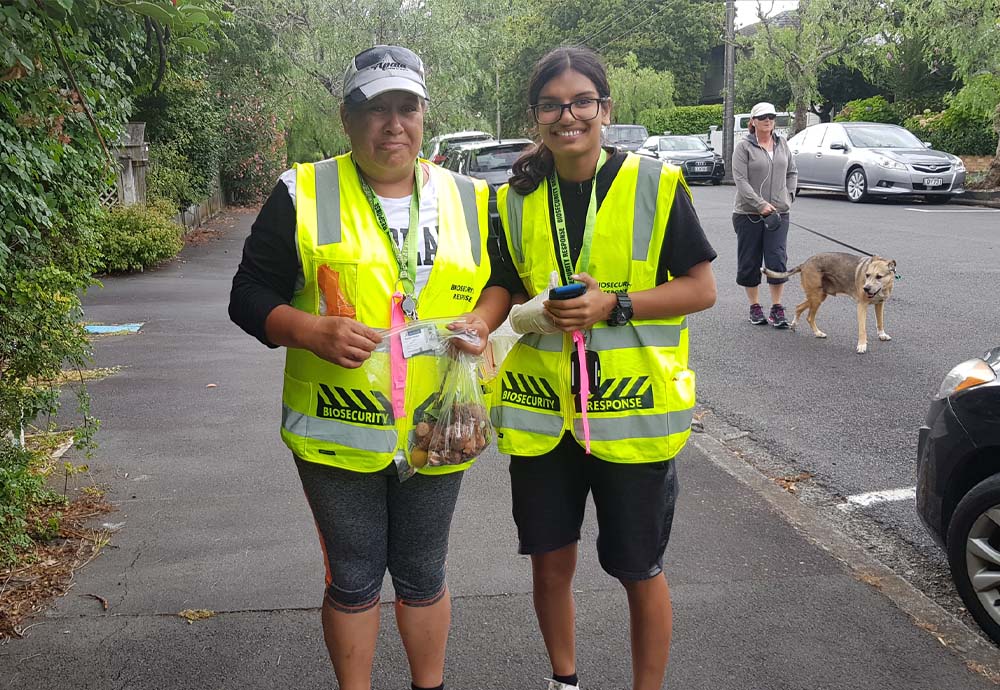
Project: Queensland Fruit Fly Response 2019
The successful 2019 fruit fly response, collaboratively governed by Biosecurity New Zealand and the horticulture industries, is a clear example of people from across all walks of life coming together to protect what New Zealanders value.
The year‐long response was the largest fruit fly operation ever in New Zealand and involved a large and diverse group of people. The planning and execution of the response was a collective effort between Biosecurity New Zealand, Government Industry Agreement (GIA) horticulture industry partners, service providers, local authorities, iwi, and the wider Auckland public including local businesses and residents.
The response required the involvement of multiple communities who wanted and needed to be informed and involved – including a diverse range of cultures, languages, and ages to consider. With multiple response sites and ongoing detections, messages were changing by the hour as new discoveries were being made which put huge pressure on the available resources required to run back-to-back responses.
The operation cost Biosecurity New Zealand and horticulture industries $15 million and was the second fully cost-shared biosecurity response under GIA, and the first in the horticulture sector. This contribution, plus the priceless commitment and dedication from the local community contributed to the effectiveness of the operation.
Finalist: Pea Weevil Response Group - GIA Industry Award
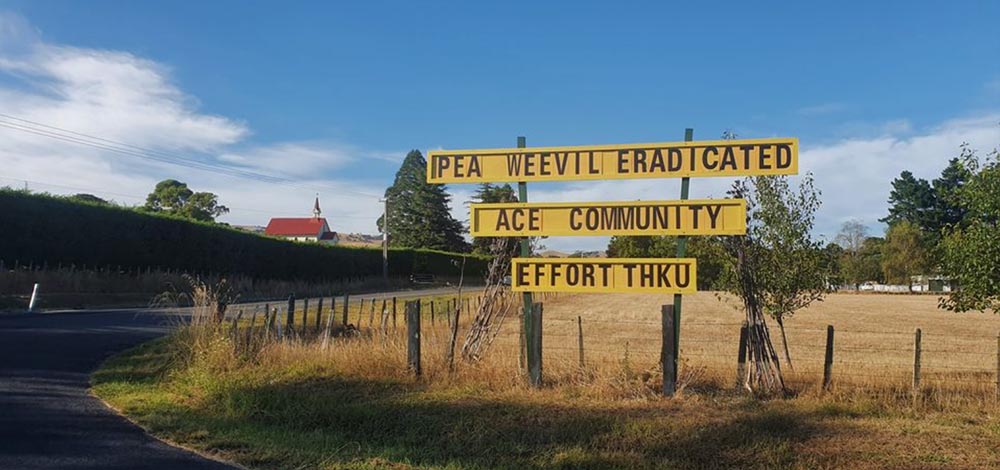
Project: New Zealand eradicates pea weevil
The successful eradication of the pea weevil, which threatened the country’s $130 million pea industry when first detected in early 2016, after an almost four-year ban on pea plants and pea straw across the region. The high level of awareness and support from industry and the Wairarapa community was the essential factor that achieved eradication success – believed to be a world first.
The motivation for this awards entry is to recognise and celebrate the groups and people that were involved from the community, industry, government, Biosecurity New Zealand with wider involvement throughout New Zealand - along with the innovation, engagement and success that has kept the industry competitive globally.
The group includes:
- Wairarapa community including retailers and urban home gardeners of the region.
- Wairarapa Growers and Federated Farmers of New Zealand Arable Group.
- Local council and local Ministers of Parliament.
- Foundation for Arable Research (FAR).
- New Zealand Grain & Seed Trade Association (NZGSTA) and member companies throughout the country.
- Technical Advisory Group (TAG) - including industry, research organisations, overseas technical experts and Ministry for Primary Industries.
- AsureQuality.
- Biosecurity New Zealand’s Governance Group and Biosecurity New Zealand's Surveillance Incursion Investigation, Plant Health and Environment Laboratory, Communications and Response teams.
Minister's Biosecurity Award
Winner: Linda Peacock - Minister's Biosecurity Award
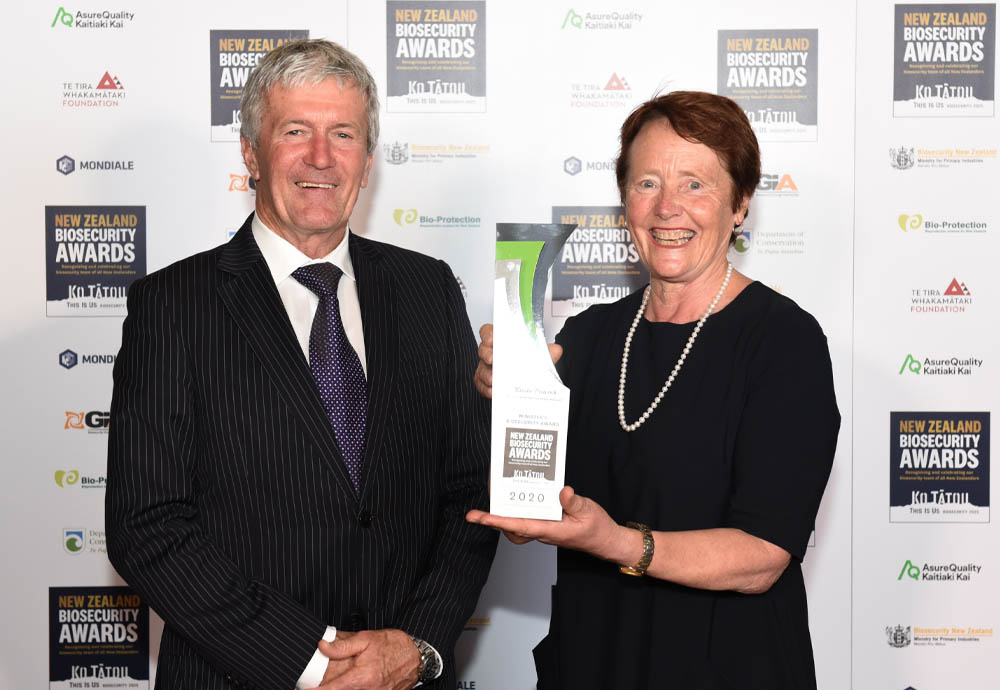
For services to the kiwifruit industry
Linda has worked tirelessly with growers and technical teams from across the regions for more than 30 years, taking science-based lessons and turning them into easily understood, practical solutions to help kiwifruit growers.
Highly regarded across industry, she’s been an incredible mentor who always puts the needs of growers first, with passion and empathy.
She’s also an active contributor to regional biosecurity networks KiwiNet and Tauranga Moana Biosecurity Capital, a member of the PSA research steering group and the Zespri crop protection steering group, and a long-standing industry liaison and technical specialist at Kiwifruit Vine Health.
Linda’s leadership, expertise and unwavering commitment to guarding against unwanted pests and diseases has been an asset to the industry and our communities across Aotearoa.
Hear from our award winner:
New Zealand Biosecurity Special Award
Winner: New Zealand Kiwifruit Industry - New Zealand Biosecurity Special Award
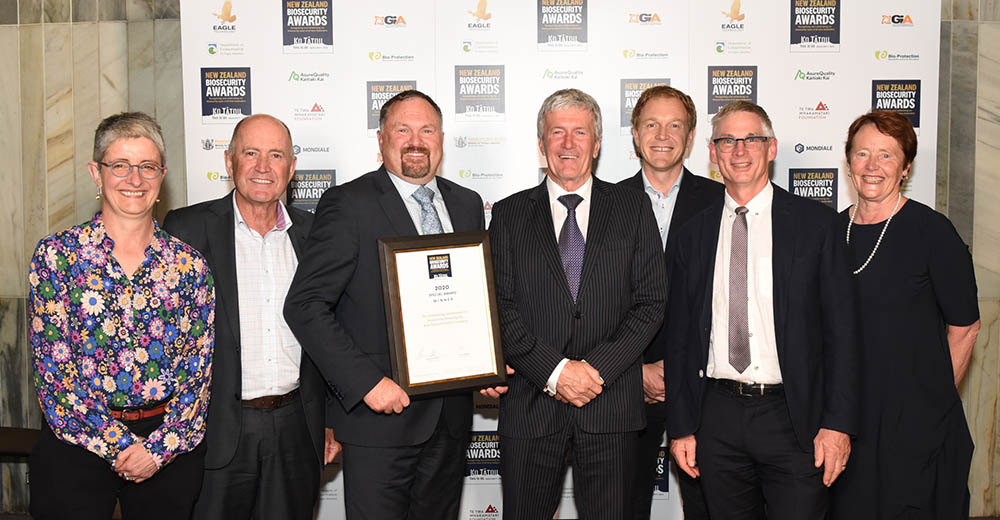
For outstanding commitment to biosecurity
Our kiwifruit industry has demonstrated exceptional leadership in the face of biosecurity incursions, driving research and managing the impacts, while also ensuring the welfare of our growers.
The industry, alongside MPI, laid the foundations for a new era of biosecurity partnership, with the first signing of the Government Industry Agreement for Biosecurity Readiness and Response Deed – a commitment to working together on preparing for pests and disease and on managing them if an incursion occurs.
The resilience demonstrated by this industry during earlier responses has carried through to today; it continues to pride itself on driving a collaborative approach to biosecurity and is an early adopter of new and innovative ways to managing this on behalf of its growers and the wider New Zealand food and fibre sectors.
Hear from our winner:
Department of Conservation Community Pihinga Award for new projects/initiatives
Winner: Marine Meter Squared (Mm2), New Zealand Marine Studies Centre - Department of Conservation Community Pihinga Award
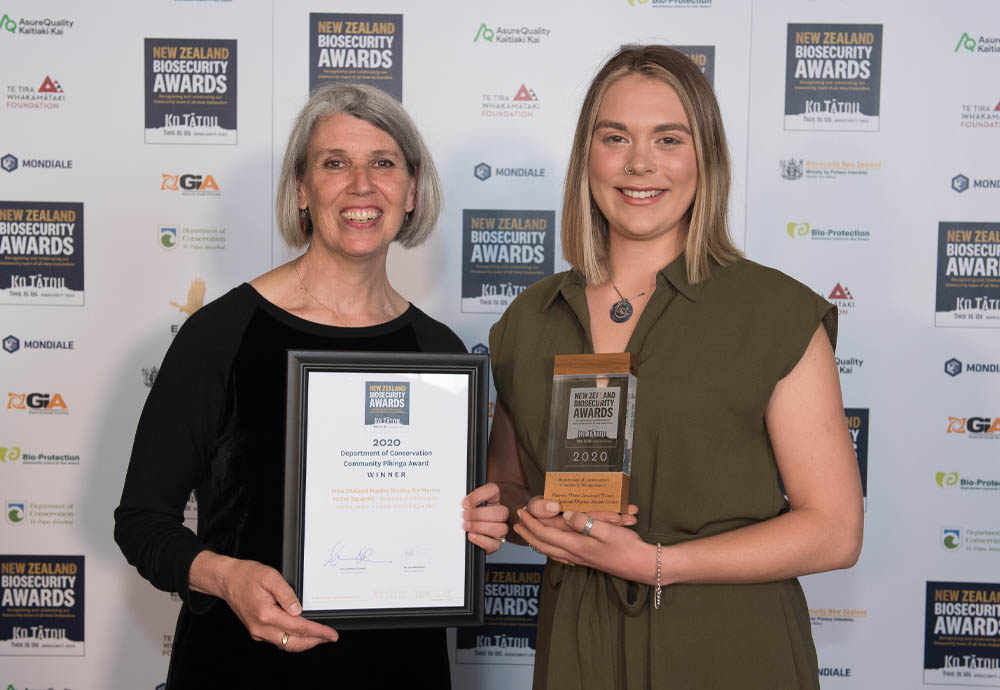
Project: Seashore monitoring for marine pests - a citizen science approach
Marine Metre Squared (Mm2) is a nationwide citizen science project that aims to get communities involved in the long-term monitoring of the seashore, raise awareness of biodiversity and biosecurity and changes in the marine environment, build links between scientists, educators, schools, community and iwi groups who care about the seashore environment and want to look after it.
By running educational programmes and workshops in communities and schools, alongside developing resources for people to use, Mm2 have been able to connect with a wide audience both online and in-person.
Hear from our award winner:
Finalist: Better Border Biosecurity/Auckland Botanic Gardens - Department of Conservation Community Pihinga Award
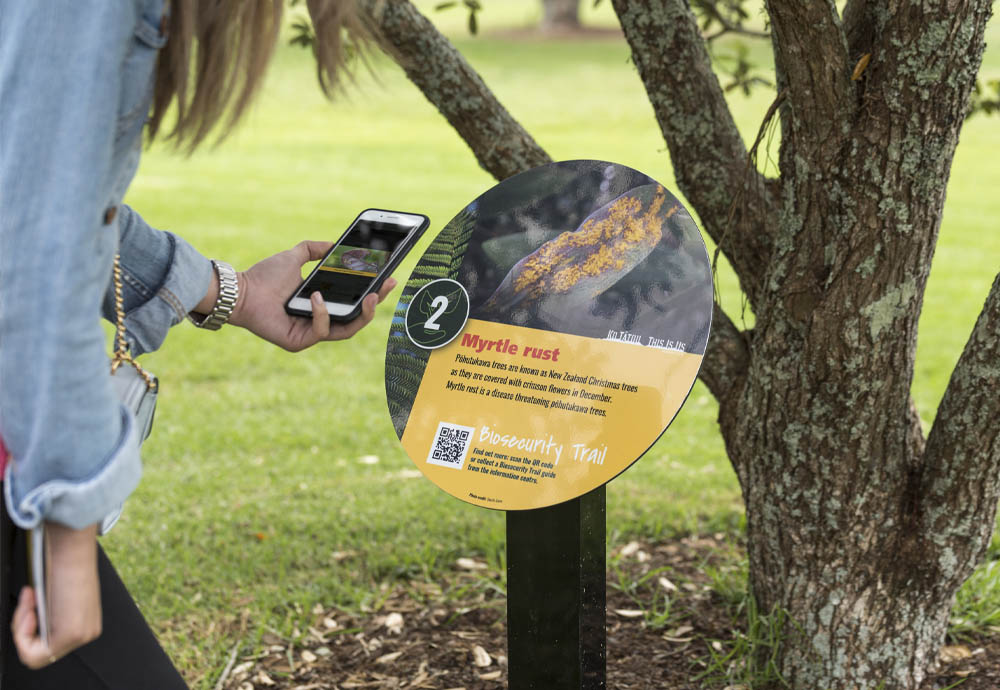
Project: The Biosecurity Trail at Auckland Botanic Gardens
The Biosecurity Trail at Auckland Botanic Gardens opened in April 2019, giving visitors a unique opportunity to learn about biosecurity risks to the plants of Aotearoa. The two-kilometre trail raises awareness and helps reduce the impact of biosecurity risks to native and productive plant species through community engagement.
A brochure and map guides people around 12 checkpoints where information about pests and pathogens is presented along with a QR code to scan for more information and tips to prevent spread. Biosecurity threats to tree species of particular value to Māori are highlighted. The Trail is grounded in the Ko Tātou This Is Us principle recognising the role every New Zealander (and New Zealand visitor) has in preventing pests, pathogens and weeds from getting into the country and stopping their spread if they do.
Finalist: Predator Free Wellington - Department of Conservation Community Pihinga Award
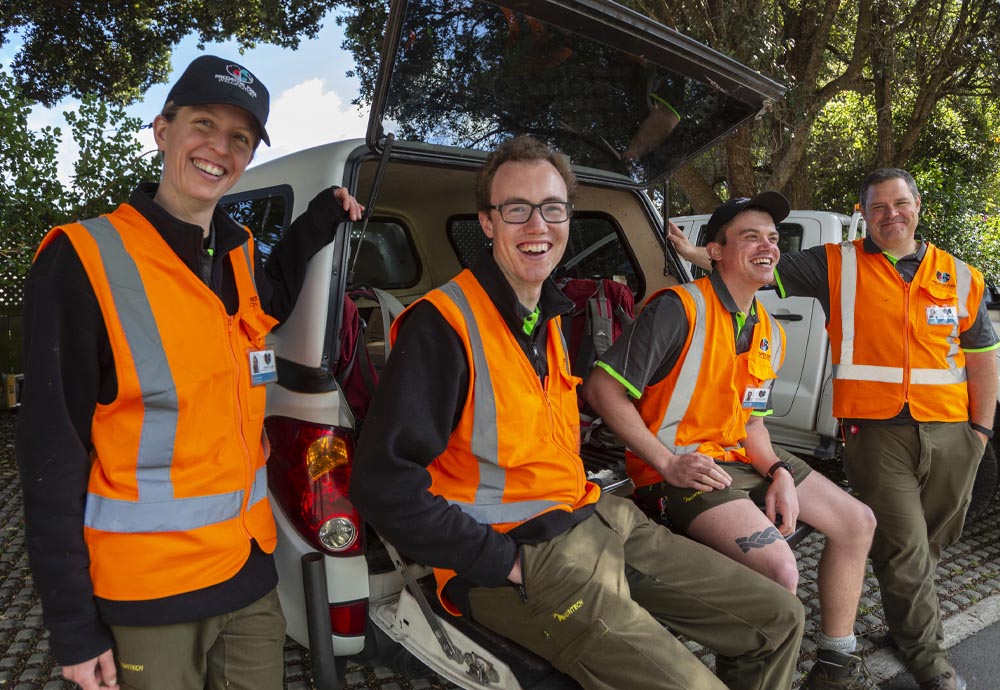
Project: Miramar eradication project
Predator Free Wellington (PFW) is New Zealand’s biggest urban predator eradication project. The aim is to completely eradicate rats, possums, and mustelids from Wellington’s Miramar Peninsula - an area of 30,000 hectares where 212,000 people live. PFW will undertake a staged eradication across five phases over 10 years. The first phase started on 1,000 hectares in 2019 and is in the final stages of completion, with the last few pockets of rats being removed, and moving into a biosecurity phase.
The project has involved getting 3,000 permissions from residents, landowners and businesses to house a device on their property. Around 7,000 bait stations and traps and 16,000 monitoring devices were deployed across the peninsula during the project.
Department of Conservation Community Kahiwi Award for established projects/initiatives
Winner: Rotokare Scenic Reserve Trust - Department of Conservation Community Kahiwi Award
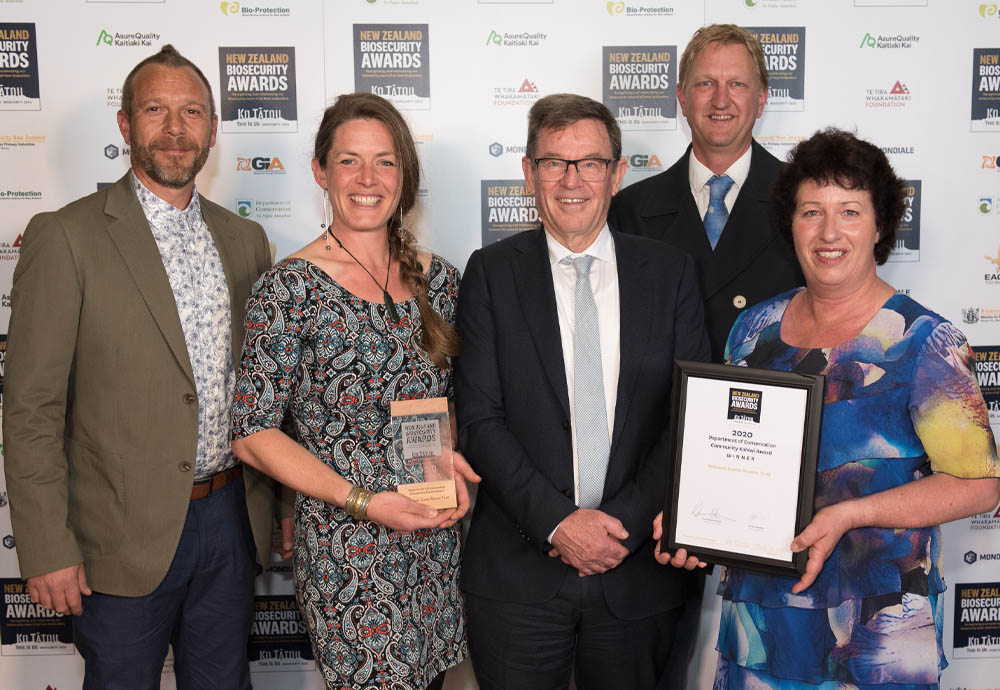
This community-led success story celebrates the ambition and determination of the community to create and sustain a pest-free sanctuary, underpinned by a constant and priority focus on quality biosecurity delivery. This project demonstrates the purpose of Predator-free goals, and provides motivation and inspiration to the whole region.
The Rotokare sanctuary is possibly the largest essentially mouse-free environment on mainland Aotearoa. A strong biosecurity history has enabled significant indigenous species reintroductions, including the return of tieke and hihi after c.150-years regional extinction, and pāteke after c.100-years regional extinction. A partnership project has established a kiwi breeding population, and has now begun translocating kiwi to other sites. The sanctuary is also a source for other species translocations.
A several thousand hectare trapping programme in partnership with surrounding landowners has provided major community inspiration, enabled a kiwi translocation to a nearby site, and the return of pāteke to Taranaki. Due to pāteke predation soon after their release, a significant up-scaling of feral cat control has demonstrated the significant issue this species presents.
A comprehensive environmental education and engagement programme reaches out region-wide, empowering the future generation of leaders with knowledge and inspiration to lead their communities to improve the prospects for indigenous biodiversity.
Hear from our award winner:
Finalist: Windy Hill Rosalie Bay Catchment Trust - Department of Conservation Community Kahiwi Award
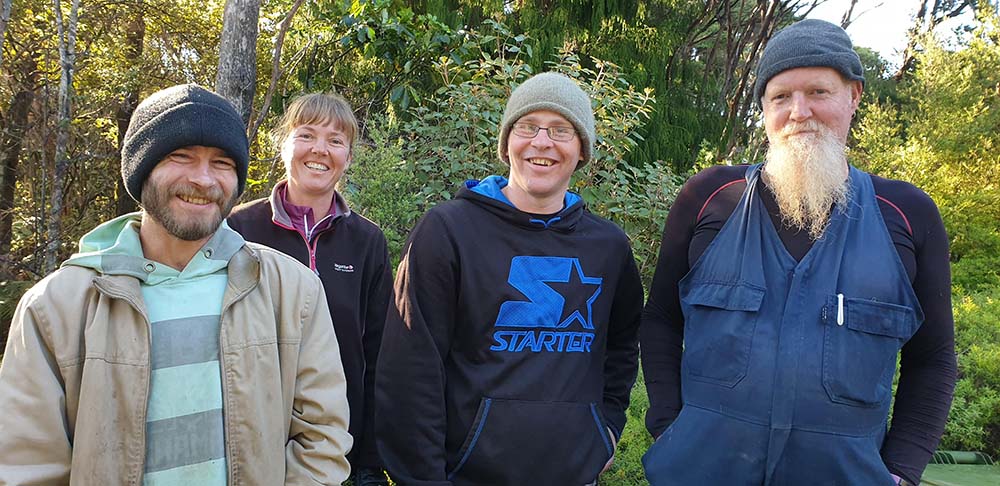
Project: Windy Hill Sanctuary, Great Barrier Island
The Sanctuary’s aim is to sustain and enhance the biodiversity of the area through on-going and vigilant biosecurity. This includes the removal of invasive plants and animals, creating a sanctuary within which native species can flourish, threatened species can be protected, and species that have been lost to the island reintroduced.
The Trust engages the community in the benefits of conservation and is committed to helping the fragile economy of Great Barrier Island by creating conservation-based employment.
Finalist: Friends of Waiwhetū Stream - Department of Conservation Community Kahiwi Award
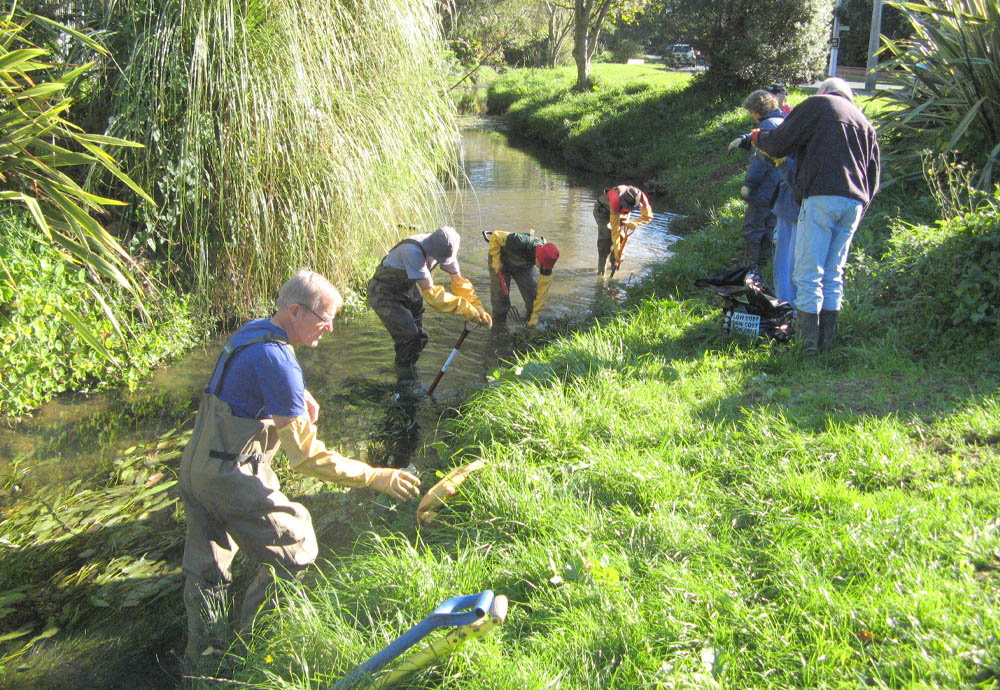
Project: Against the odds
Claiming eradication of a pest species is rare; claiming it for an aquatic pest plant is probably unique.
The community volunteer group Friends of Waiwhetū Stream, Lower Hutt have eradicated a South African plant, Cape pondweed, from Waiwhetū Stream. A small group of dedicated volunteers gave up their Sunday afternoons every fortnight for nearly three years to manually dig it out of nearly four kilometres of stream bed. It had been present for about 100 years causing accumulation of sediment, slowing stream flows and other negative ecological impacts on water quality.
All aspects involving the Cape pondweed removal initiative were done by volunteers, starting with scientific research into its reproductive biology and growth habit, and establishing a removal/eradication strategy based the results.
Between 2011 and 2014, approximately 350,000 individual plants were removed from the entire infested stream bed along with large volumes of rubbish. Bi-annual patrols continued to remove extant plants with numbers reducing from 145 in 2015 to five in 2018 and none for more than 12 months.
In addition, more than 30,000 eco-sourced native plants have been planted along the stream banks. Volunteers have created a ‘living’ legacy for future generations.
Support with rubbish removal, gear and plants were provided by Greater Wellington Regional Council and Hutt City Council.
Te Tira Whakamātaki Māori Award
Winner: Te Rawhiti 3B2 Ahu Whenua Trust - Te Tira Whakamātaki Māori Award
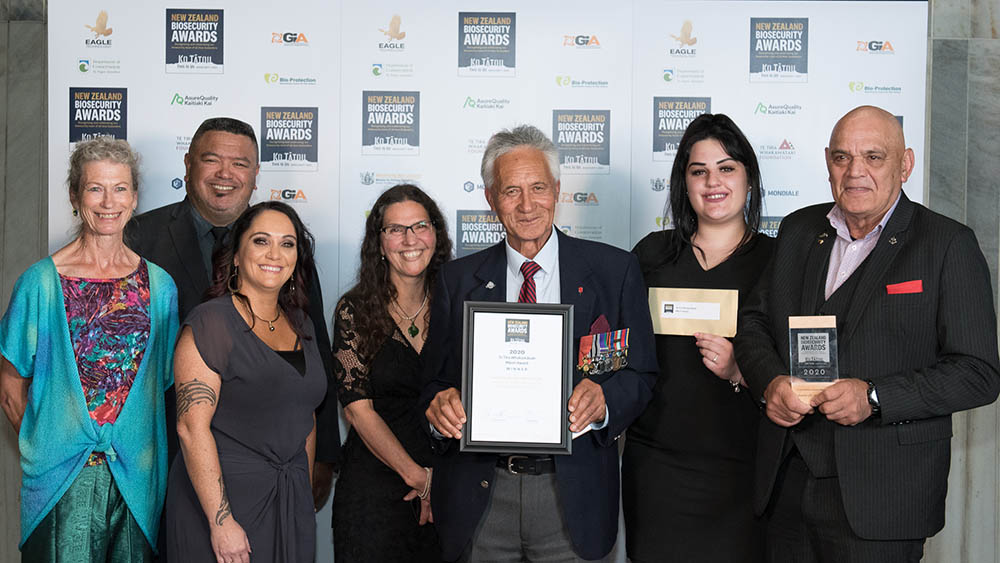
Project: Nga Kaitiaki o Ipipiri Herenga Waaka (Guardians of the Bay of Islands)
Te Rawhiti 3B2 Ahu Whenua Trust with support from mana whenua Patukeha Hapū and Ngati Kuta Hapū have been conducting pest control and assisting with native bird re-locations in the Bay of Islands for over 20 years.
The mahi has involved clearing and maintaining trapping tracks, placing and checking traps and bait stations, monitoring birds and helping with translocations, and conducting a controversial, but very successful, 1080 toxin aerial drop on Rākaumangamanga (Cape Brett Peninsula). Pest control and conservation work by hapū members on Urupukapuka Island has ensured populations of kākāriki, tīeke (saddleback), pōpokotea (whiteheads), and toutouwai (robins) are flourishing.
The 3B2 Trust has also assisted several researchers, including PhD students, studying the marine and terrestrial ecology of the Bay of Islands, and so the next generation of New Zealand conservationists and ecologists will have an understanding of kaitiakitanga.
Hear from our award winner:
Finalist: Graeme Atkins, Ngāti Porou - Te Tira Whakamātaki Māori Award
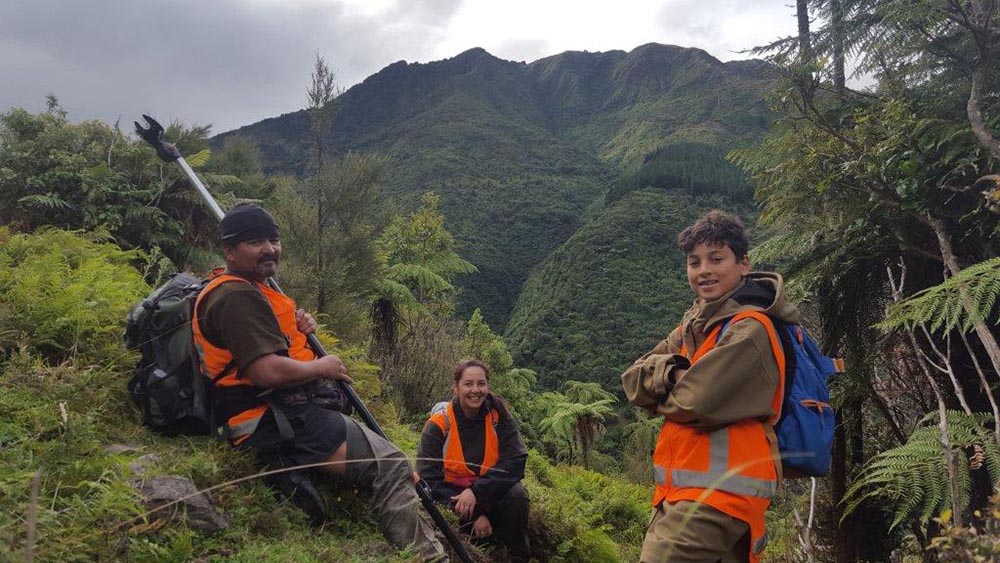
For 25 years, Graeme Atkins has personified kaitiakitanga on the East Coast and has become a national icon for what it means to be a Māori protecting the ngahere. His outstanding contribution to the Biosecurity system, and his magnanimous contributions to long-term regional projects, are endorsed by anyone who knows him or knows of his mahi.
A quiet and humble man, you are most likely to notice his smile and positive wairua before he even says a word. The worn out boots he is likely to be wearing and his ringa raupa may betray the fact that he is a recognised expert in ecology, leader in indigenous conservation, and a tohunga in rongoā and mātauranga of the ngahere.
His knowledge and experience have been invaluable to New Zealand’s biosecurity system. He was vital in the Myrtle Rust response for not only his rohe, but for Māori all over the country dealing with the impacts of the plant pathogen. Graeme also plays leading roles in long-term management of unwanted organisms and pest control programmes. From the board rooms to the hills, Graeme has been and will continue to be, a key player in the biosecurity system.
Finalist: Te Poho o Rawiri Marae - Te Tira Whakamātaki Māori Award
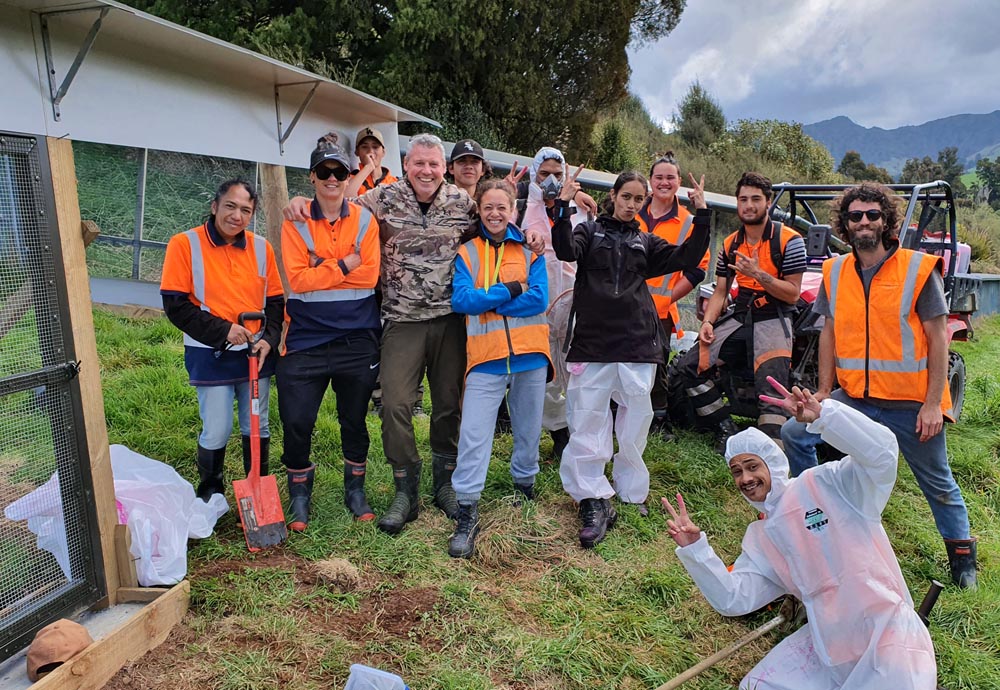
Project: Whaia Tītīrangi
Ngati Oneone are the tangata whenua of the rohe that stretches from Te Toka a Taiau in the mouth of the Turanganui river all the way to the Pouawa river. Within its boundaries, Titirangi and Tuamotu Island are considered tapu to Ngati Oneone. These places have held significance to many iwi/hapū since the arrival of te iwi Māori to our shores.
The maunga today is currently under a co-management agreement between Ngati Oneone as mana whenua and the Gisborne District Council. With so many native plants to be cared for on the maunga, Whaia Tītīrangi, an holistic operational programme, was piloted to suppress an emerging weed issue and alleviate the strain on young plants.
The pilot has been an unmitigated success in co-management relationships between a Council and local mana whenua.
Kura (School) Award
Winner: St Paul's Collegiate School - Kura (School) Award
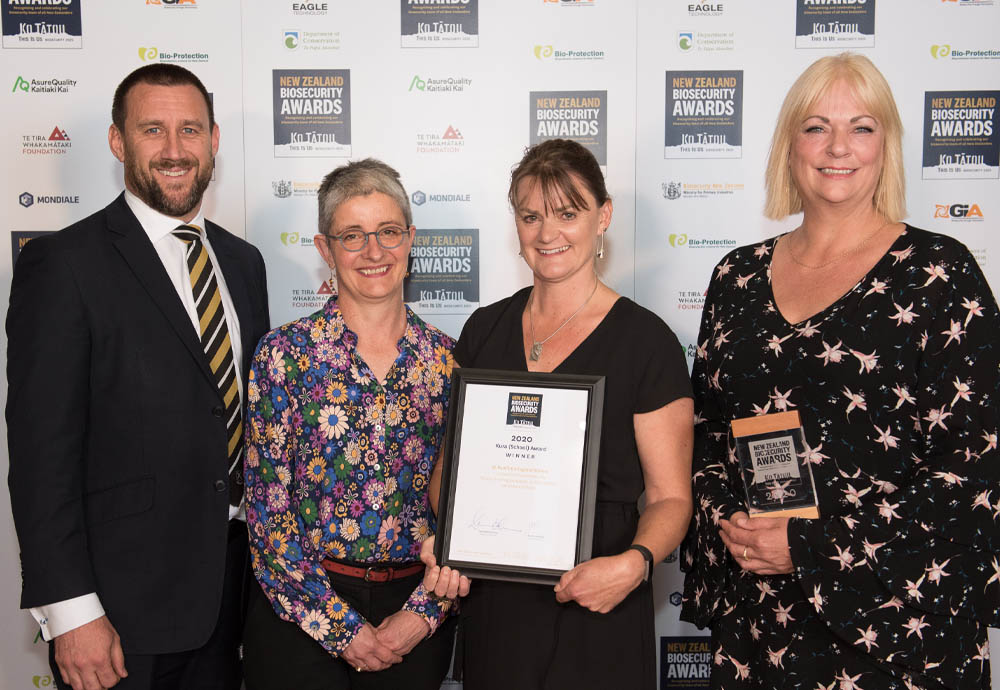
Programme: Understanding biosecurity future-proofing strategies in New Zealand secondary schools
Through its agribusiness programme, St Paul’s Collegiate School is committed to taking the lead to meet primary industry needs by growing the talent, skills and abilities of students to better prepare them for careers in agribusiness.
The agribusiness programme encourages students to look at issues facing the primary sector, including biosecurity, where they gain a good understanding of topics such as Mycoplasma bovis or the Queensland fruit fly.
Using the biosecurity context, they’ve written a suite of schemes and resources for one of the new agribusiness achievement standards at NCEA Level 3 – future proofing strategies. St Paul’s Collegiate School has made this available to all New Zealand secondary schools.
These resources allow students to learn about the potential impacts biosecurity may have on the primary industries and why all New Zealanders need to ensure our country is kept safe from pests and diseases, and to use innovative ideas to provide future-proofing strategies for the industry.
Hear from our award winner:
Finalist: Kerikeri Kindergarten - Kura (School) Award
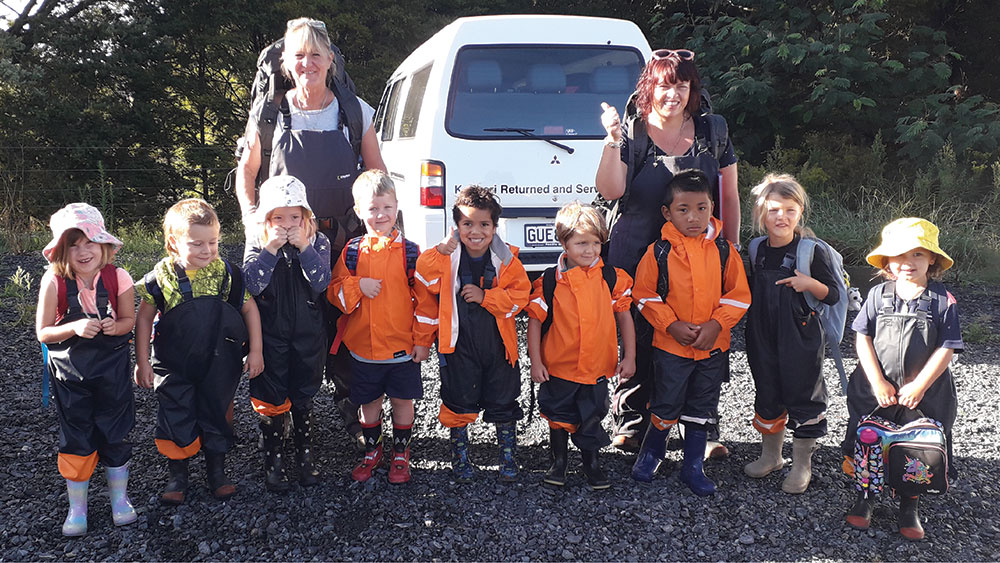
Programme: Ngahere
This innovative programme based on a native bush block is teaching Kerikeri Kindergarten children about the importance of kaitiakitanga and what they can do to care for the ngahere. Based in the Bay of Islands, the Silver enviroschool is using the ngahere to connect tamariki with nature at an early age (four to five years old) and give them the knowledge they need in order to become guardians of the bush. Each week the oldest children go to “their” ten-acre native bush block on private land for the day.
The programme was launched about 18 months ago after six months of training, planning and consultation with the local community. It’s brought together tamariki, a local environmental Trust, the Kiwi Coast conservation initiative and the generous owner of the bush, in a unique collaborative partnership that is benefitting everyone involved. They learn by experience and discover the joy that can be found in nature.
The ngahere gives them a gift – the opportunity to fall in love with their bush and reconnect with Papatūānuku through their play. The programme extends out into kindergarten families, making this initiative a real community affair.
Finalist: Lynmore Primary School - Kura (School) Award
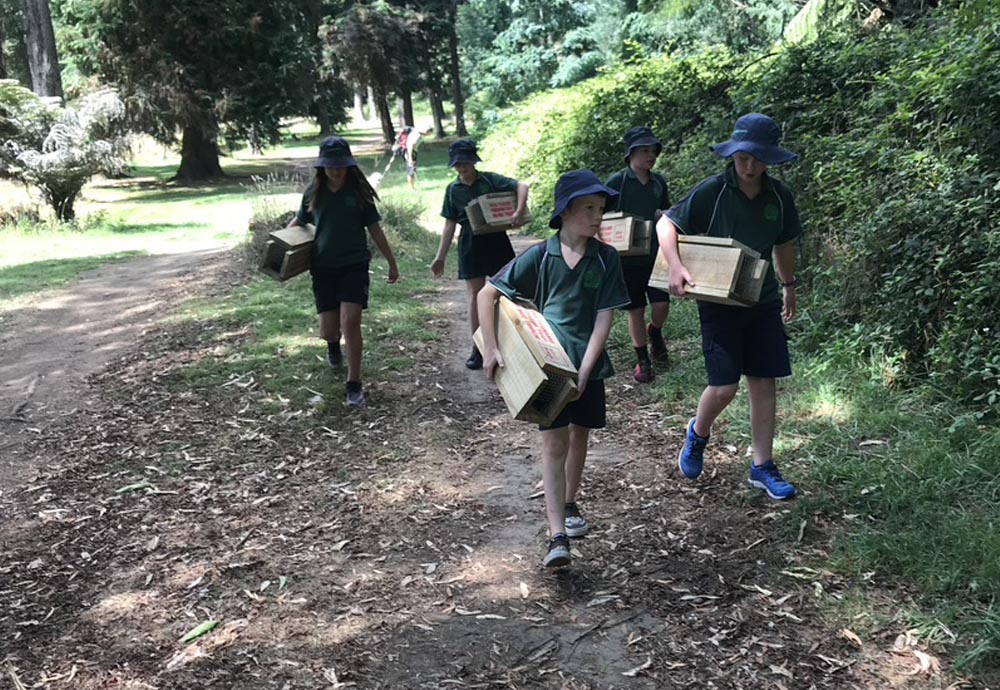
Student-led initiatives have been at the heart of Lynmore Primary School biosecurity activities. Their predator trapping journey started five years ago when a parent of a child offered them a DOC200 trap to catch rats in the school’s native bush area. Five years on from setting this one trap, they have built and given out over 100 traps to people in their local community; handed out over 100 traps to the Whakarewarewa Pest Free group; provided and helped maintain traplines on Mokoia Island bird sanctuary; and they themselves maintain two traplines in Whakarewarewa Forest and a trapline in their school grounds.
They also work closely alongside William Anaru of Te Arawa Lakes Trust on catfishing projects in Lake Rotorua and Lake Rotoiti and have netted and removed hundreds of catfish from these lakes. A large number of students at the school have had the opportunity to go to these roto and see the native fish and kōura that are being affected by these pest fish, creating some lifelong hunga tiaki.
They have also removed invasive plants from the native bush and planted native species with the support of Tatau Pounamu, Rotorua Tree Trust and Bay of Plenty Regional Council.
Eagle Technology Local and Central Government Award
Winner: Dr Mary van Andel, MPI - Eagle Technology Local and Central Government Award
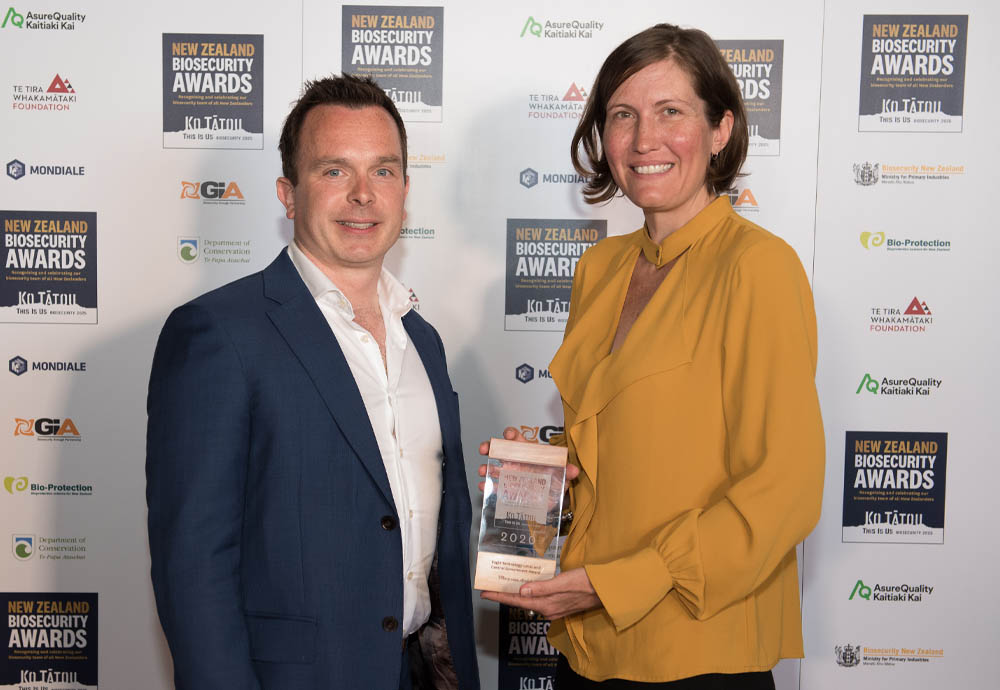
Strategic leadership for Mycoplasma bovis and COVID-19 responses
Scientific excellence and courage are critical to biosecurity and protecting our precious taonga – and Mary’s life work epitomises this. A strategic veterinary epidemiologist, Mary has spearheaded the strategic design of the Mycoplasma bovis response - a world first attempt to free New Zealand of the cattle disease - since 2017. Mary is also a pivotal member of the M. bovis Strategic Science Advisory Group that steers the science research to support the eradication programme.
More recently she played a key role in the Ministry of Health’s COVID-19 response – bringing her strategic disease tracing skills to serve New Zealand. Mary is Principal Advisor to MPI’s Chief Scientist and a member of the Australia NZ College of Veterinary surgeons – where her contributions to epidemiology saw her awarded the Chris Baldock Award in 2013.
Her PhD and life’s work has made an enormous contribution to New Zealand’s knowledge of animal population and surveillance data for use in national disease control, emergency management and outbreak investigation, as well as modelling and analysis.
Hear from our award winner:
Finalist: Waikato Regional Council - Eagle Technology Local and Central Government Award
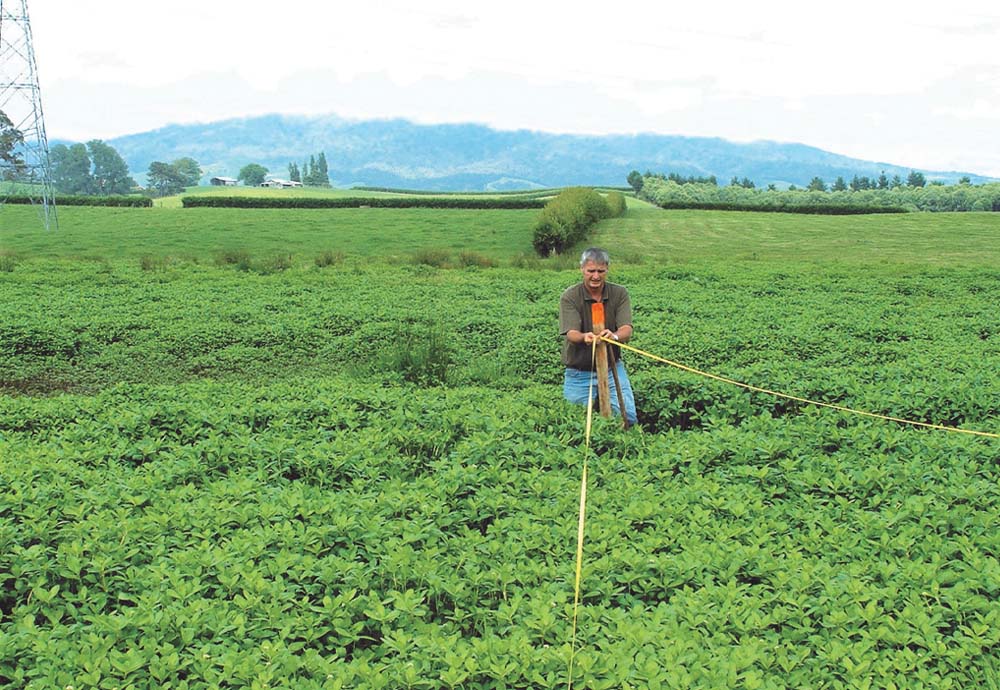
Programme: Waikato alligator weed management programme
Alligator weed is regarded as one of the world’s worst weeds. In New Zealand, it spreads by the tiniest of fragments, and grows superfast on water and land, making it expensive and difficult to control.
The weed is rife in Northland and Auckland, and Waikato Regional Council is successfully holding the line and preventing its spread south through the Waikato and to the rest of New Zealand. Our ability to manage alligator weed is critical for the environmental and economic prosperity of the Waikato region and regions south of our boundaries.
Alligator weed can completely cover waterways from bank to bank and outcompete native plants, pasture and crops. It is present in the Waikato River, the life force of the region, between Port Waikato and Cambridge. Without control, the river – the largest in New Zealand – would be reduced to a narrow channel. Blankets of alligator weed would reduce water quality and flow, and impact on conservation areas, hydroelectricity production (eight dams on the Waikato River) and takes for municipal water, agriculture and industries. It would reduce productivity of the land, with the Waikato being one of the richest agricultural and pastoral areas in the world.
Finalist: Wellington City Council - Eagle Technology Local and Central Government Award
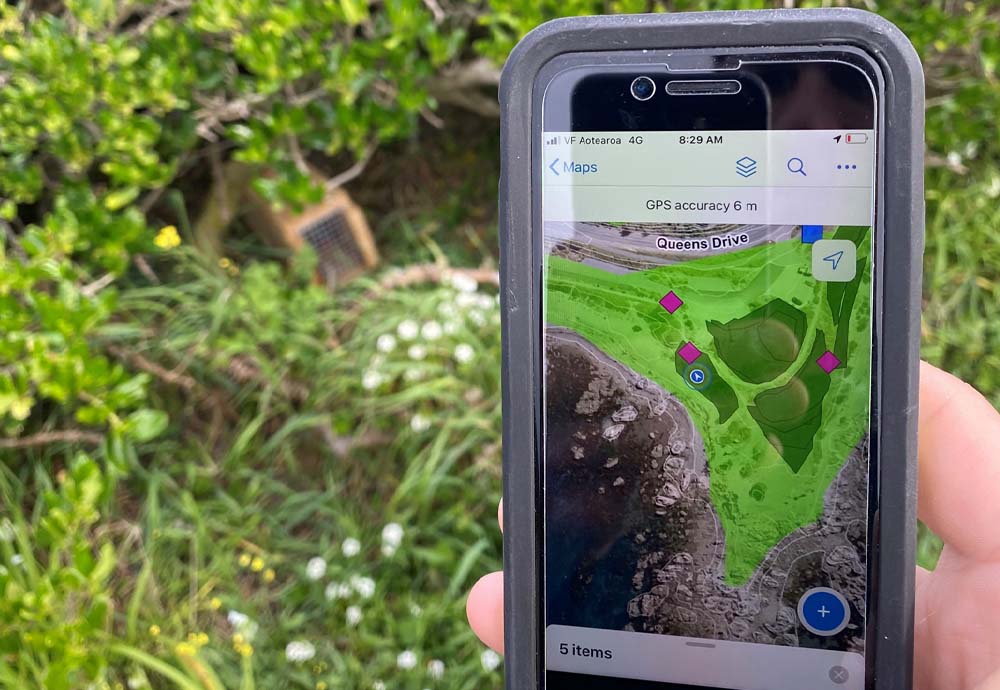
Project: Animal pest management dashboard for Wellington City
Wellington City Council has created an animal pest management map and data viewing tool to inform future decision-making and planning of pest animal control within an urban environment. The application integrates various data sources including live spatial data from 30 community trapping groups, and a city-wide possum control network managed by Greater Wellington Regional Council.
It incorporates data from other pest control programmes such as Capital Kiwi and Predator Free Wellington to provide an holistic view of pest control measures in Wellington City with a focus on possums, mustelids and rats.
In addition, the application captures data of feral rabbit, feral goat and feral pig control through professional hunters. Integrating the data was a challenge as it was stored on various platforms and required permissions from all agencies to ensure that data is shared safely and that personal details are protected through the entire process.
Bio-Protection Research Centre Science Award
Winner: Onside - Bio-Protection Research Centre Science Award
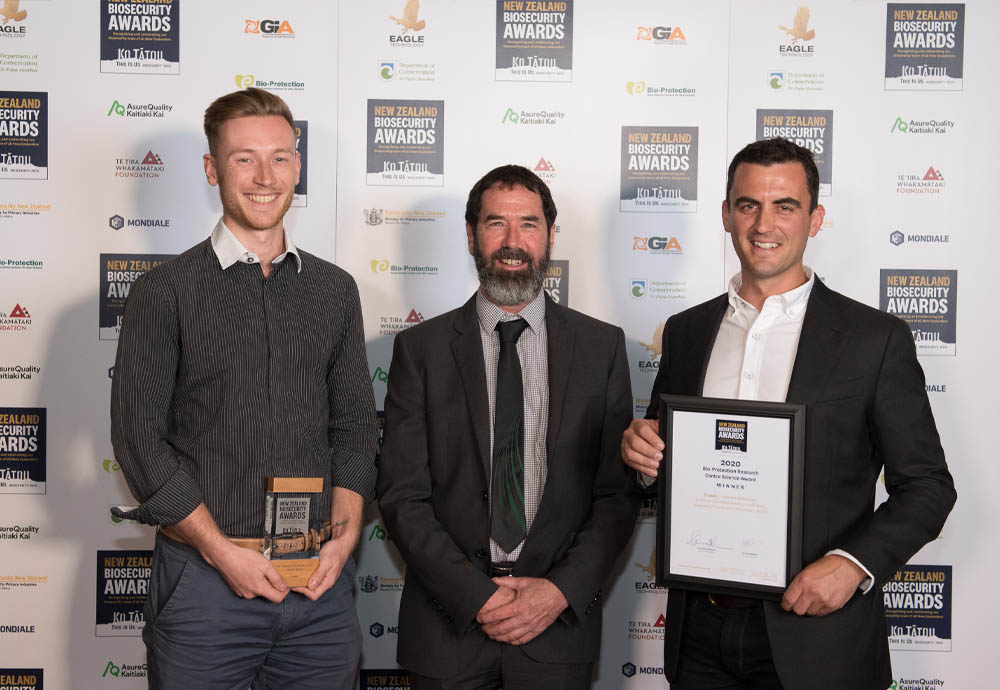
Programme: Network technology to inform risk-based testing, eradicating biosecurity incursions in the primary sector
There are approximately 300,000 rural properties in New Zealand which are linked by an estimated 100,000,000 annual movements. These stock movements mean that rural New Zealand is joined via a giant interconnected network. Although this connectedness has improved business efficiency, it has also meant that disease can spread much more effectively.
With the support of Callaghan Innovation and Agricultural and Marketing Research and Development Trust, along with world leading scientists, Onside has created a biosecurity system, Onside Intelligence (OSI), that is capable of managing readiness and response within the complexities of the modern world.
Onside Intelligence uses data from a range of sources to construct an intricate rural network which can be used to map disease pathways and feed algorithms to direct disease testing and management activity in the fastest and most resource efficient way.
Hear from our award winner:
Finalist: Mātauranga Māori and Molecular Science - Bio-Protection Research Centre Science Award
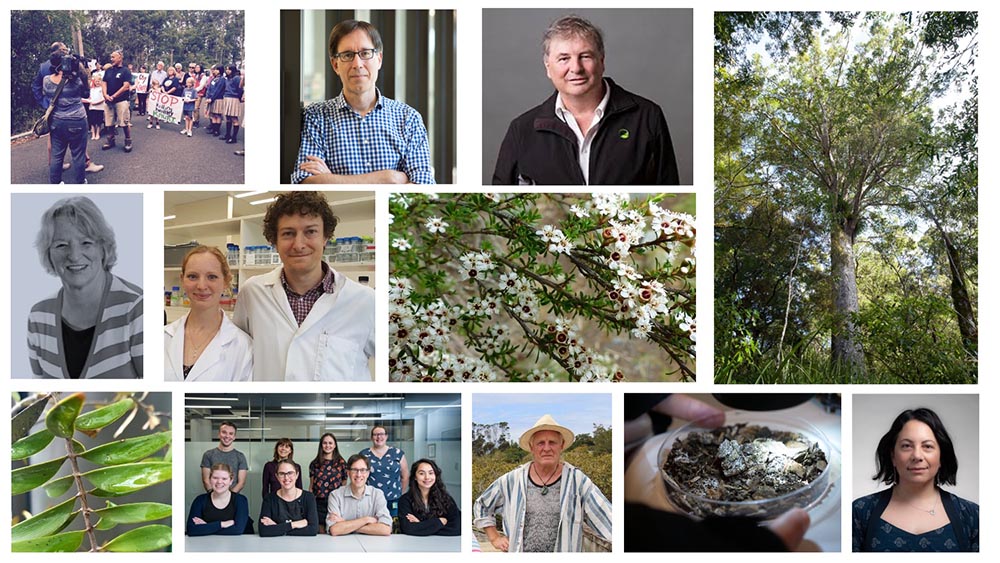
Project: Working together to stop kauri dieback and other plant diseases
Kauri are ecologically important and culturally treasured trees in Aotearoa New Zealand. They are under threat from the microbial pathogen Phytophthora agathidicida, which causes kauri dieback disease. Related Phytophthora species also impact key crops (e.g. avocados) in New Zealand, causing reduced crop yields.
The team combines leading scientists with Whakahono Mātauranga (the ones who connect to the Mātauranga) to find new ways to manage these devastating diseases. The team leaders include: Mr. Chris Pairama (Te Taou, Ngati Whaatua), Mr. Ian Mitchell (Te Uri Taniwha, Ngāpuhi), and Dr Monica Gerth (Victoria University of Wellington). The cross-disciplinary research team also included Dr Scott Lawrence from the University of Otago, Professor Nigel Perry and Ms Elaine Burgess from Plant & Food Research, Associate Professor Wayne Patrick from VUW, and Dr Amanda Black from Lincoln University.
Together, they identified native plants – selected based on mātauranga Māori – that are effective against many of the lifecycle stages of Phytophthora. Their collaborative approach not only provides new tools for controlling kauri dieback and other Phytophthora-related diseases, but also highlights the power of combining knowledge systems.
Finalist: Dr Petra Muellner, Epi-Interactive - Bio-Protection Research Centre Science Award

Programme: Scientific excellence strengthening New Zealand biosecurity and One Health frameworks
Scientific excellence through innovation and collaboration are vital - to address the ongoing risks to New Zealand biosecurity and protecting our precious taonga. The work of Dr. Petra Muellner and Epi-Interactive epitomise this effort through connecting science, data and people.
Epi-Interactive have worked with DairyNZ to develop the Dairy Biosecurity Risk Evaluation Framework (D-BRiEF), to rank biosecurity risk organisms to the dairy sector. This work has proved a significant tool in the fight against future biosecurity risks to our largest export sector- dairy. Supporting both New Zealand government and industry Petra has also worked closely with MPI, developing for example the Biosecurity Surveillance Evaluation framework (SurF) and the Biosecurity Surveillance Guide, an interactive online tool.
Petra and her team have supported ground-breaking work which has left the New Zealand biosecurity and health systems – and wider international biosecurity frameworks stronger.
Mondiale Innovation Award
Winner: Groundtruth Ltd - Mondiale Innovation Award
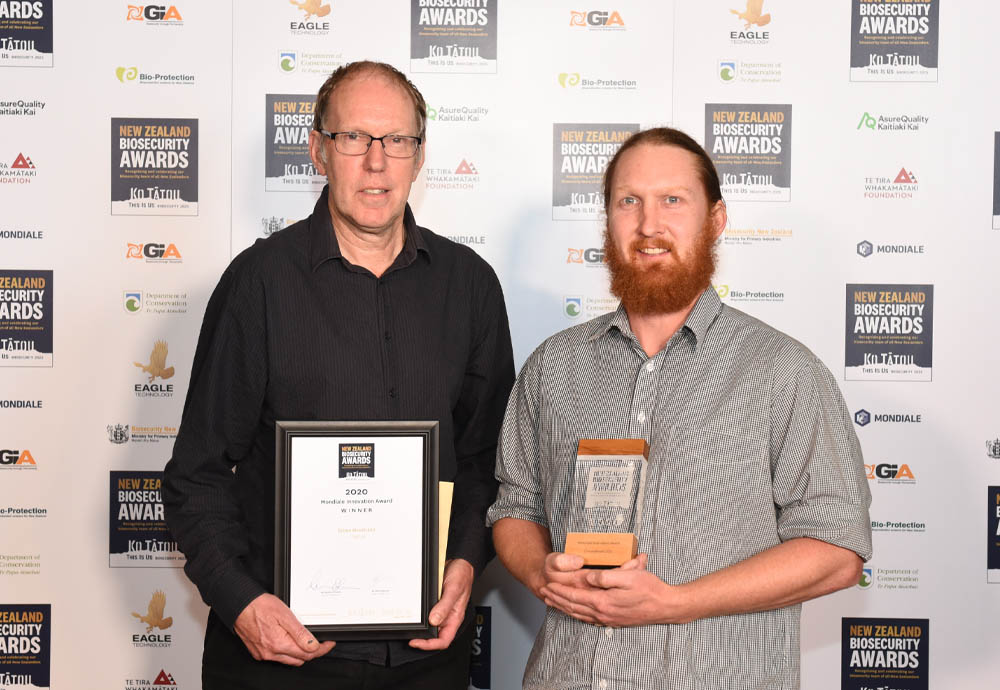
Programme: Trap.nz
Operating since 2014, Trap.nz is now the largest trapping database in the country and the leading software solution for pest management and outcome monitoring in New Zealand.
Trap.nz is the result of engaging with a widely dispersed community with large-scale pest control projects, and by building an interactive tool to establish manage, and link these projects. Users can set up, manage and report on their projects using the system.
Trap.nz is in constant development with innovation always at the forefront. Trail camera recording and reporting has been added and radio sensor traps, which electronically notify Trap.NZ when triggered, are included.
An open map API allows data to be viewed on a wide variety of systems, which is particularly useful for councils to manage trap deployments in partnership with community groups.
Hear from our award winner:
Finalist: Onside - Mondiale Innovation Award
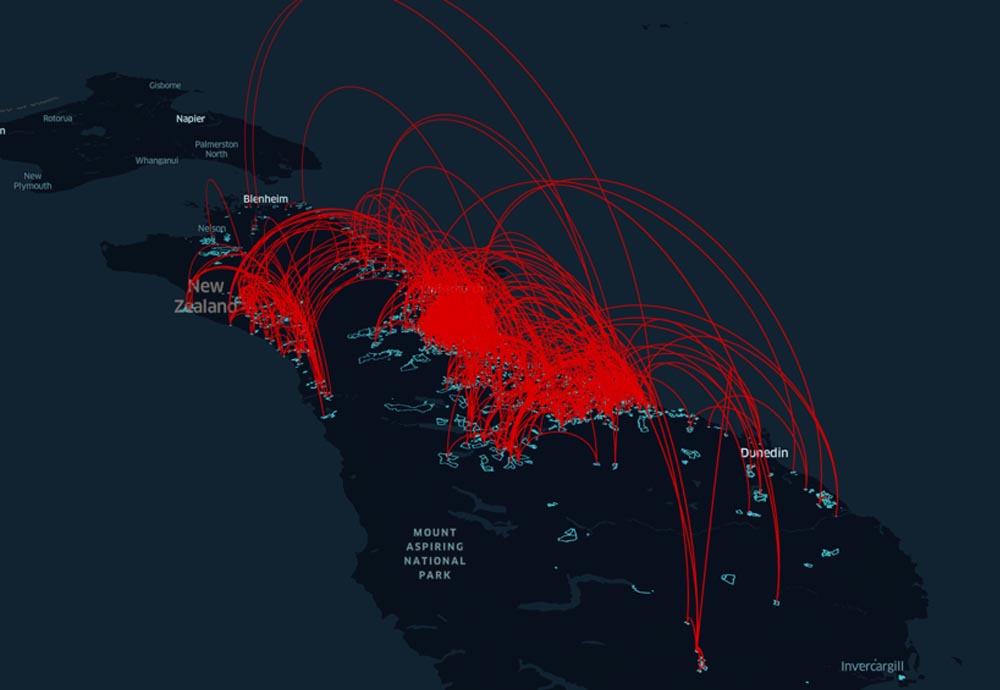
Programme: Network technology to inform risk-based testing, eradicating biosecurity incursions in the primary sector
There are approximately 300,000 rural properties in New Zealand which are linked by an estimated 100,000,000 annual movements. These movements mean that rural New Zealand is joined via a giant interconnected network. Although this connectedness has improved business efficiency, it has also meant that disease can spread much more effectively.
Onside has created a biosecurity system, Onside Intelligence, that can manage readiness and response within the complexities of the modern world. Onside Intelligence uses data from a range of sources to construct an intricate rural network which can be used to map disease pathways and feed algorithms to support management activity in the fastest and most resource efficient way.
Finalist: Predator Free Wellington - Mondiale Innovation Award

Programme: Miramar eradication project
Predator Free Wellington is about system change, demonstrating that in the face of widespread environmental degradation a dedicated collective of people can change the tide. The project has successfully created a social movement with 50 suburbs undertaking trapping throughout Wellington.
AsureQuality Emerging Leader Award
Winner: Thomas (Tame) Malcolm from Te Tira Whakamātaki and Te Arawa Waka - AsureQuality Emerging Leader Award
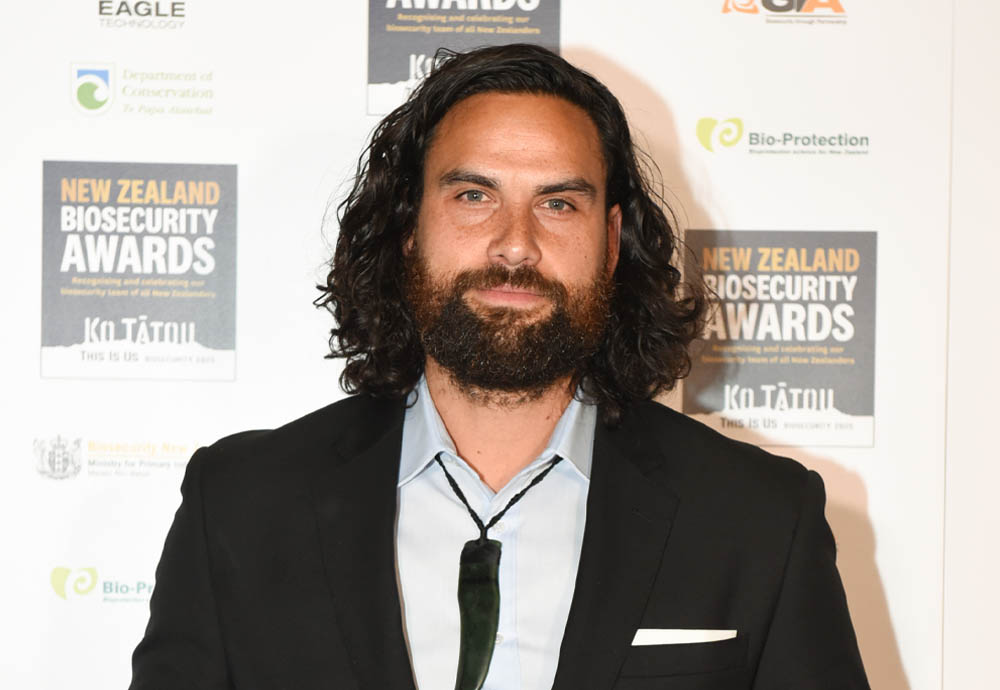
Tame Malcolm (Te Arawa: Ngāti Tarāwhai, Ngāti Pikiao, Ngāti Ngararanui, Tapuika, Ngāti Whakaue, Ngāti Ruanui) has more than a decade’s experience in environmental management roles in the Bay of Plenty, Waikato, Canterbury and Marlborough regions. This has included working for OSPRI (TB Free), Waikato Regional Council, Department of Conservation (Waikato) and most recently Te Tira Whakamātaki (the Māori Biosecurity Network).
Tame is an avid hunter and trapper who grew up in the bush, on the water and embedded in te ao Māori.
He and his current mahi is committed to; protecting the whenua; helping Māori entities protect their environment; ensuring Māori have access to and a say in how other agencies protect the environment; and maintaining and elevating the Māori worldview in science and environmental management/protection especially as it relates to biosecurity.
Hear from our award winner:
Finalist: Ethan McCormick from Howick College - AsureQuality Emerging Leader Award
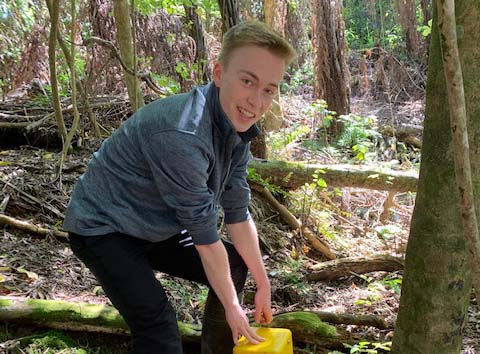
Ethan is currently head boy, and the student rep on the Howick College BOT, leads the enviro group at Howick College and serves on the Pest Free Howick Committee (comprising members from Howick Rotary, Lions and Auckland Council). Predator control took on a new dimension at Howick College after Ethan’s proactive involvement in inquiry-based rat trapping.
He leads a predator control team of students who supervise the rat traps at Mangemangeroa Reserve. Ethan’s input in predator control has made his work ‘this is what we do’ for a sustainable environment. The point of difference is the structured and analytical model that is adopted that makes his work sustainable. His environmental action expands from school, to Mangemangeroa Reserve, Cockle Bay coastal bush and the Howick community.
Finalist: Yanika Te Paea Reiter from the University of Waikato - AsureQuality Emerging Leader Award
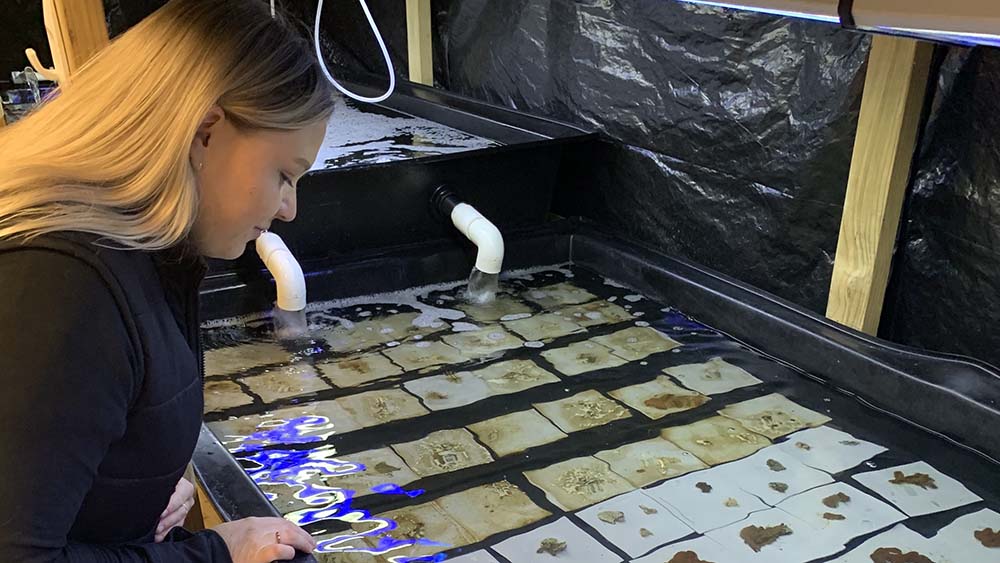
Yanika Te Paea Reiter is a young scientist of excellence having very recently submitted her MSc research Thesis on “Comparing Competitive Interactions and Settlement Success Among Native and Non-indigenous Species in Marine Hard Bottom Communities of Colonial Ascidians, from the Bay of Plenty, New Zealand”.
Given her motivated research drive along with her eagerness to educate and inform others at any opportunity, Ms Reiter has been employed in an MBIE funded ‘Smart Idea’ Program to examine marine invasion mitigation options invoking chemical defensive surfaces on port structures and enhancing the resilience of native species assemblages to preclude settlement of invasive species.
Yanika has a passion for native species of Aotearoa New Zealand and the preservation of our unique biodiversity, both in terrestrial and marine environments.
